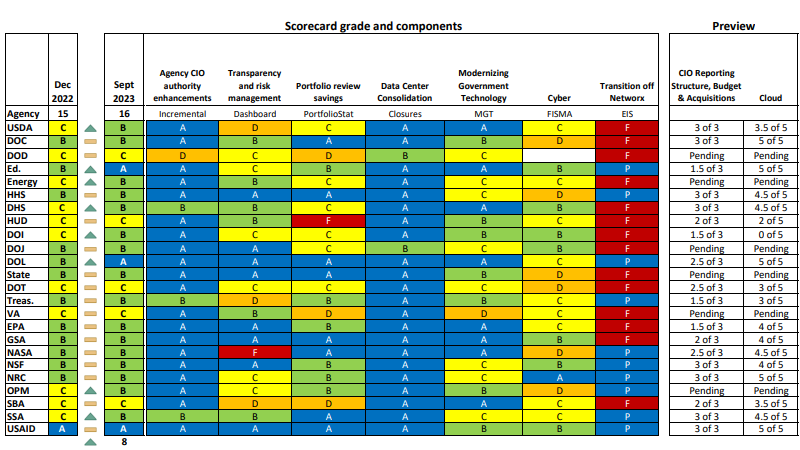
One-third of the 24 Federal CFO Act agencies earned higher grades on the 16th edition of the FITARA Scorecard released today by the office of Rep. Gerry Connolly, D-Va., ranking member of the House Oversight Subcommittee on Cybersecurity, Information Technology, and Government Innovation.
The FITARA Scorecard grades are compiled by the Government Accountability Office (GAO) and have been published on a semi-annual basis – usually by the House Oversight and Accountability Committee – since 2015. The scorecard grades the 24 largest Federal agencies across an evolving range of IT-related categories.
Today’s release of the 16th edition of the FITARA Scorecard marks a departure from the usual procedure, in which the House Oversight releases the scorecard, and then its government technology-focused subcommittee holds a formal hearing to discuss the results. Instead, Rep. Connolly is holding a roundtable discussion this afternoon with representatives from GAO and five Federal agencies to discuss the results.
Top-Line Trends
On the latest scorecard, eight agencies saw their overall grades improve by one full grading letter, while the other 16 agencies hung steady with their grades from the 15th edition of the scorecard released in December of last year. No agency earned a lower grade, and none received worse than a “C” grade overall.
Three of the 24 agencies aced the scorecard test by earning “A” grades overall. The U.S. Agency for International Development (USAID) maintained its “A” grade from the previous scorecard, while both the Department of Education and the Department of Labor earned overall “A” grades this time around – from “B” grades last December.
The latest scorecard features seven grading categories for which scores were assigned – 1) agency CIO authority enhancements; 2) transparency and risk management; 3) portfolio review savings; 4) data center consolidation; 5) modernizing government technology; 6) cyber; and 7) transition off Networx contract.
Several of the agencies receiving higher overall grades on the latest report notched improvements in their scores for transitioning more fully to the General Services Administration’s Enterprise Information Solutions (EIS) contract for communications services and away from the previous Networx contract. Others earned the higher overall grades through improvements in data center consolidation, cyber, and modernizing government technology scoring categories.
The 16th edition of the scorecard also previews two future grading categories – one for cloud and one for CIO reporting structure, budget and acquisitions – that did not contribute to overall agencies grades this time around but provide a window into GAO’s thinking for future scoring categories.
By the Letters
Here’s a quick look at the gainers and steadier grades on the 16th installment of the FITARA Scorecard. As always, the easiest way to make sense of the House Oversight committee’s multicolored scorecard is to view the results on MeriTalk’s FITARA Dashboard.
Eight Agencies Improved
A total of eight agencies earned higher grades on the latest scorecard:
- Agriculture Department rose to “B” from “C”;
- Education Department rose to “A” from “B”;
- Energy Department rose to “B” from “C”;
- Homeland Security Department rose to “B” from “C”;
- Interior Department rose to “B” from “C”;
- Labor Department rose to “A” from “B”;
- Office of Personnel Management rose to “B” from “C”;
- Social Security Administration rose to “B” from “C.”
16 Agencies Hung Steady
The remaining 16 agencies maintained the same grade on the latest scorecard compared to the December 2022 version:
- USAID, with an “A” grade;
- Commerce Department, with a “B” grade;
- Defense Department, with a “C” grade;
- Department of Health and Human Services, with a “B” grade;
- Department of Housing and Urban Development, with a “C” grade;
- Justice Department, with a “B” grade;
- State Department, with a “B” grade;
- Transportation Department, with a “C” grade;
- Treasury Department, with a “B” grade;
- Department of Veterans Affairs, with a “C” grade;
- Environmental Protection Agency, with a “B” grade;
- General Services Administration, with a “B” grade;
- NASA, with a “B” grade;
- National Science Foundation, with a “B” grade;
- Nuclear Regulatory Commission, with a “B” grade; and
- Small Business Administration, with a “C” grade.
